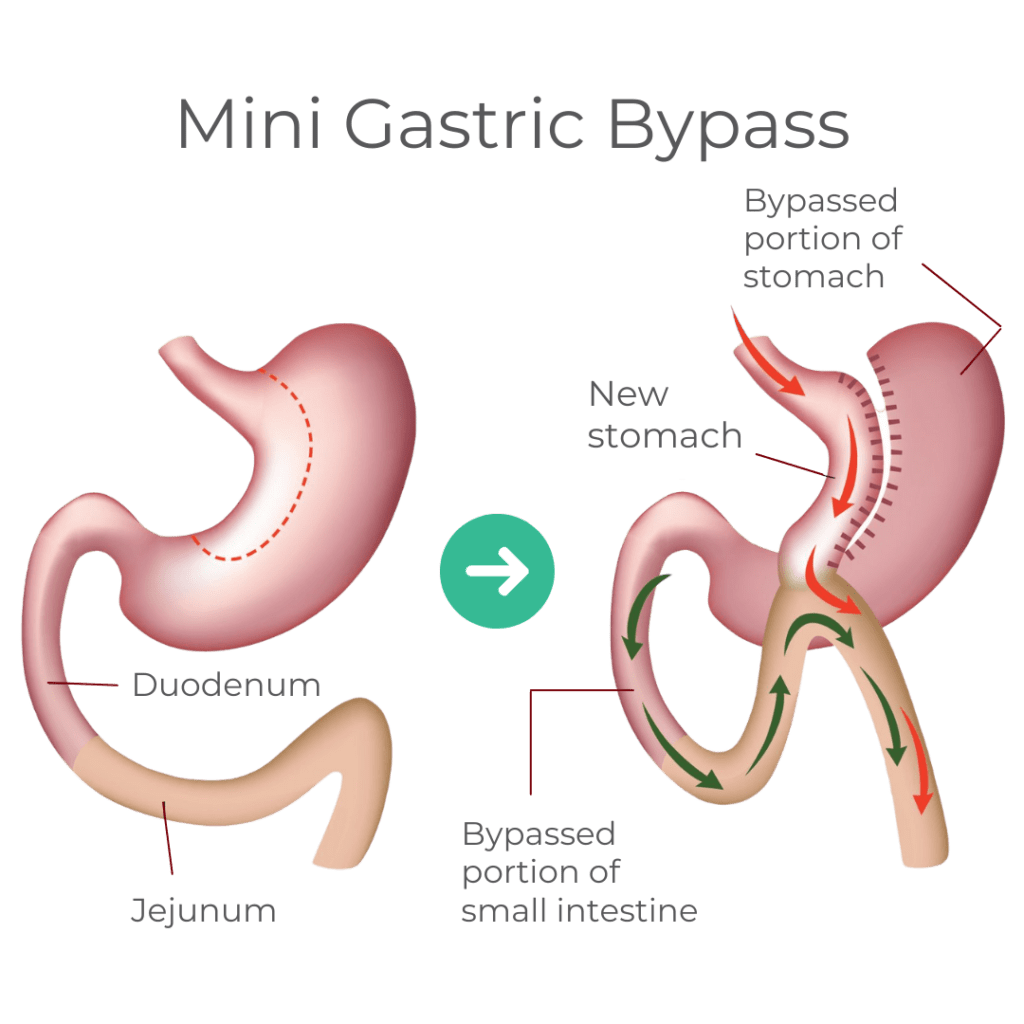Bariatric Surgery
Home / Procedure Detail

Bariatric Surgery
- Procedure
- Bariatric Surgery
If you are obese and have been unable to lose weight through diet or exercise, you may be a candidate for bariatric surgery. This type of surgery restricts how much food you can consume and/or interferes with the body’s ability to absorb nutrients.
Why it’s done
Bariatric surgery is done to help you lose excess weight and reduce your risk of developing obesity-related health complications, some of which can be life-threatening. These include:- Heart disease and stroke
- High blood pressure
- Nonalcoholic fatty liver disease (NAFLD) or nonalcoholic steatohepatitis (NASH)
- Sleep apnea
- Type 2 diabetes
Who it’s for
You may be a candidate for bariatric surgery if:- Your body mass index (BMI) is at 40 or above, considered extreme obesity.
- Your BMI falls in the range of 35 to 39.9 and you have a serious weight-related health problem such as type 2 diabetes, high blood pressure, or severe sleep apnea.
- There are some cases where people with BMIs between 30 and 34 may qualify for certain types of weight-loss surgery if they also have serious weight-related health problems.

Procedure Primary Points
- Bariatric Surgery Types: Overview of common procedures
- Roux-en-Y Gastric Bypass: Most common bypass surgery
- Sleeve Gastrectomy: 80% stomach removal, reduced hunger
- Biliopancreatic Diversion with Duodenal Switch: Dual-section surgery
- Results: Weight loss, improved health conditions
Types of bariatric surgery
There are multiple types of bariatric surgery, each with its own set of advantages and disadvantages. It’s important to have a discussion with your doctor about which procedure would be best for you. Here is an overview of some common surgeries:
- Roux-en-Y (roo-en-wy) gastric bypass. Roux-en-Y (roo-en-wy) gastric bypass surgery is the most common type of bypass surgery. This procedure is typically not reversible and works by decreasing the amount of food you can eat in one sitting, as well as reducing the absorption of nutrients. The surgeon will make a cut across the top of the stomach, sealing it off from the rest of the stomach. The resulting pouch will be about the size of a walnut and can only hold around an ounce’s worth of food. Normally, a person’s stomach can hold up to 3 pints worth of food. Then, the surgeon cuts a section of the small intestine and sews it directly onto the stomach pouch. This allows food to bypass most of the stomach and enter directly into the middle part of the small intestine.
- Sleeve gastrectomy. Sleeve gastrectomy is a weight-loss surgery that removes about 80% of the stomach, leaving behind a long, tube-like pouch. This smaller stomach can’t hold as much food and produces less of the hormone ghrelin, which regulates appetite. The advantages of this procedure include no rerouting of the intestines and significantly reduced hunger cravings. Sleeve gastrectomy also requires a shorter hospital stay than most other procedures.
- Biliopancreatic diversion with duodenal switch. This surgery is split into two sections. The first being comparable to a sleeve gastrectomy then connecting the end of the intestine near the stomach in order to bypass most of it (duodenal switch and biliopancreatic diversion). This surgery both restricts how much you can eat and reduces the absorption of nutrients. While it is extremely effective, it has greater risks, including malnutrition and vitamin deficiencies.
After bariatric surgery
After weight-loss surgery, you generally won’t be allowed to eat for 1 to 2 days so that your stomach and digestive system can heal. Then, you’ll follow a specific diet for a few weeks. The diet begins with liquids only, then progresses to pureed and very soft foods and eventually to regular foods. You may have many restrictions or limits on how much and what you can eat and drink. You’ll also have frequent medical checkups to monitor your health in the first several months after weight-loss surgery. You may need laboratory testing, blood work and various exams.Results
Gastric bypass and other bariatric surgeries can provide long-term weight loss. The amount of weight you lose depends on your type of surgery and your change in lifestyle habits. It may be possible to lose half, or even more, of your excess weight within two years. In addition to weight loss, gastric bypass surgery may improve or resolve conditions often related to being overweight, including:- Heart disease
- High blood pressure
- Obstructive sleep apnea
- Type 2 diabetes
- Nonalcoholic fatty liver disease (NAFLD) or nonalcoholic steatohepatitis (NASH)
- Gastroesophageal reflux disease (GERD)
- Joint pain, also called osteoarthritis
Gastric bypass surgery can also improve your ability to perform routine daily activities, which could help improve your quality of life.
Medical Procedures
MedEx did help me a lot not only for connecting with clinics but also for other miscellaneous items such as visa extention. I am really sastify with the services received from MedEx. I've recommended to some of my friends to connect with MedEx too if they have plan to go for medical trip to BKK. 🙂
Engyin HtunSingapore 
Highly recommend to MedEx .They are professional and amazing team.
MedEx Staffs should have closed relationships with hospitals staffs to get more information and services.So,they can give the best services to patients.
Thomas FlyerMyanmar 
Owing to my heart pacemaker implant case, if I got a chance to refer anyone, without blinking my eyes I would refer to Vejthani Hospital. I am very grateful.
Bhagwan Ratna TuladharKathmandu, Nepal 
MedEx was very kind, patient, supportive and very helpful with my needs for seeing doctors and doing physical therapy here in Thailand. MedEx fulfilled everything I needed with my stay here with prompt actions, and I highly recommend MedEx if you are coming to Bangkok for medical treatment.
Ko Sai Aung Lwin TunMyanmar 










